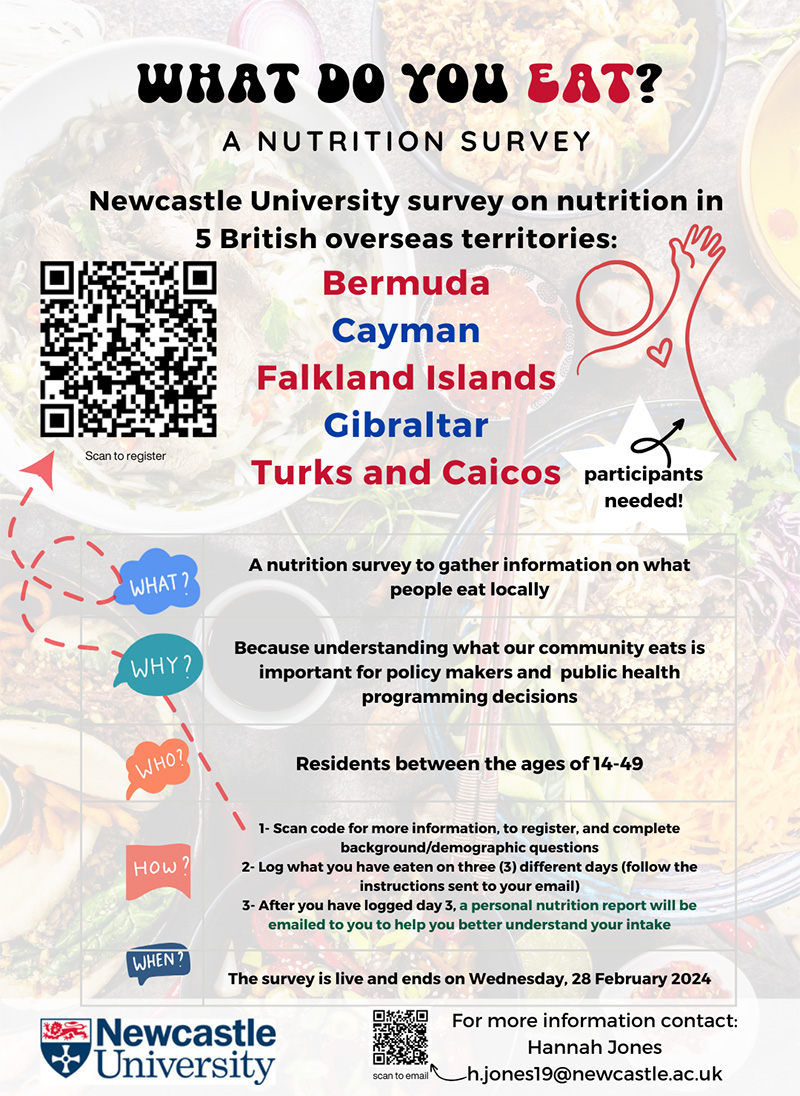Survey On Dietary Habits In Bermuda Launched
Registered Dietitian Hannah Jones is conducting research on the dietary habits of residents in Bermuda, Cayman, the Falkland Islands, Gibraltar, and Turks and Caicos “to better understand their unique and diverse dietary practices.”
A spokesperson said, “Local Registered Dietitian [RD] and Doctoral candidate at the Department of Population Health Sciences at Newcastle University [UK] Hannah Jones is conducting research on the dietary habits of residents in Bermuda, Cayman, the Falkland Islands, Gibraltar, and Turks and Caicos to better understand their unique and diverse dietary practices.
“The survey is aimed at individuals aged 14-49 years and gathers information on what people have eaten on three different days, ideally two weekdays and one weekend day. Upon signing up via the survey link or QR code, participants will be asked some demographic [background] questions and will then be emailed a personal link to the online dietary recall tool that they will use to log their dietary data on the three days. The survey is now live and will only run until 28 February, 2024. All Bermuda residents ages 14-49 years are invited to participate.”
Ms. Jones said, “Many diet and lifestyle related health issues such as diabetes, hypertension, obesity and other cardiovascular disease risk factors, which were previously seen developing in middle-aged people, are now being seen in young people and more often.
“It is essential that local health and nutrition policies are based upon relevant data that reflects the needs of their individual population. There is a lack of information across the British Overseas Territories [OTs] about dietary habits, dietary/nutrient intake data and how this might be affecting the health of their populations.
“Without local data, it is difficult for policymakers to ensure that policies and strategies have the intended impacts and outcomes for their unique communities. Understanding what, and how the population eats and drinks is important to help inform the development of localised policies and public health strategies, and to ensure the cost-effective use of public health resources.”
The spokesperson said, “Mrs. Jones is undertaking pilot population-based online nutrition surveys in individual OTs. The intention is to gather some local data about the dietary habits, meal patterns, and the general health of the communities, which will be used to create country-specific reports, providing useful information that has not previously been available.
“We hope to have sufficient participation in the surveys to be able to provide a meaningful report that reflects the needs and habits of Bermuda’s residents.
“The dietary recall tool guides users to enter the items consumed at different times during the day, including meals, snacks, supplements, and drinks. There are photographs to help determine portion sizes, and a series of prompts to clarify details and identify items that may have been forgotten, such as butter on bread, milk in drinks, gravy, etc. The dietary recalls typically take about 15-20 minutes each, with the first recall usually taking the longest, and recalls 2 and 3 quicker.”
Ms. Jones said, “The main aim is really to try to understand how people in Bermuda eat, which foods and drinks they choose, the typical meals they eat, their meal patterns, and their general health. This anonymised information will be used to create a report which we hope can be used to inform Bermuda’s own national health, nutrition, and public health policies, and health promotion activities, so that they reflect the needs and habits of our own population.
“Of course, as a pilot survey, we are also trying to see if this strategy and method works for the population, and produces relevant, useful dietary and health information. This will be useful for making decisions about collecting health and nutrition data in the future.
“If participants complete all three days of diet recall, they will be able to get a nutrition report based on their own diet logs. This nutrition report offers some great visual information about key dietary indicators, types and quantities of foods eaten from different food groups, and how their consumption compares to USDA guidelines for a variety of nutrients.”
David Kendell, Director of the Ministry of Health, said, “Although the Ministry of Health is not involved in this survey and won’t have access to any personal data provided, we endorse academic initiatives striving to enhance our comprehension of the health and wellness of our population. The upcoming STEPS to a Well Bermuda survey, conducted by the Ministry of Health in the coming months, aims to assess the overall health of the population. By looking at the data from both this survey and the Ministry’s survey, evidence-based policies and interventions may be formulated to alleviate the impact of chronic diseases like diabetes, heart disease, and hypertension in our community.”
The spokesperson said, “To get more information, to register, and to complete the background/demographic questions, click here. Questions about the surveys should be directed to Hannah Jones at h.jones19@newcastle.ac.uk.”
Read More About
Category: All



